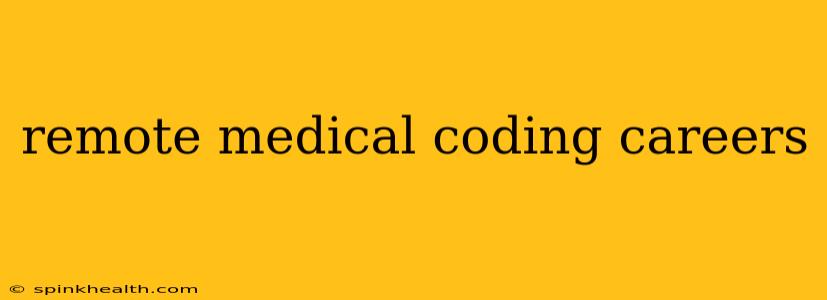Remote Medical Coding Careers: A Rewarding Path in the Digital Age
The click of the keyboard, the hum of the computer – this is the soundtrack of many modern careers, and for medical coders, it's increasingly playing out from the comfort of home. Remote medical coding careers are booming, offering flexibility, independence, and a vital role in the healthcare system. But what does this career path entail, and how can you embark on this rewarding journey? This isn't just a job; it's a chance to make a real difference, one accurate code at a time.
My name is Sarah, and I've been a remote medical coder for five years. I've seen the industry evolve, the demands change, and the incredible opportunities that have opened up for those who embrace this flexible work style. Let me share my experience and guide you through the ins and outs of this exciting field.
What is Medical Coding?
Medical coding is the process of translating medical diagnoses, procedures, and services into standardized numerical and alphanumeric codes. These codes are essential for insurance claims processing, medical billing, and data analysis within healthcare facilities. Think of it as the language that allows healthcare providers to communicate with insurance companies and track crucial patient information. Accuracy is paramount – an incorrect code can delay payments, lead to financial losses for providers, and ultimately impact patient care.
What are the benefits of a remote medical coding career?
This isn't just about working from home; it's about a lifestyle change. The benefits of a remote medical coding career are numerous:
- Flexibility: Set your own hours (within reason, of course, depending on your employer or client), work from anywhere with a stable internet connection, and tailor your workday to your personal needs.
- Independence: Be your own boss (to a certain extent), managing your workload and deadlines. This fosters a sense of ownership and control over your career.
- Work-Life Balance: Enjoy a better work-life balance by eliminating commutes, office politics, and the rigid structure of a traditional office setting.
- Variety: Many remote coding positions offer diverse tasks, working with different healthcare specialties and keeping the work engaging.
How do I become a remote medical coding professional?
The path to becoming a successful remote medical coder involves dedication and the right training.
- Education and Certification: Obtain a medical coding certification. The Certified Professional Coder (CPC) credential is widely recognized and respected within the industry. Numerous online programs and community colleges offer comprehensive medical coding courses.
- Experience: Gain experience, either through internships or entry-level positions in a clinical setting. This will help you build your practical skills and understand the workflow of a medical office.
- Networking: Networking is crucial. Connect with other medical coders, attend industry events (even virtual ones!), and leverage online platforms like LinkedIn to build your professional network.
- Building your online presence: Create a professional online profile showcasing your skills and experience. This is essential for attracting remote job opportunities.
What skills do I need for a remote medical coding job?
Beyond technical knowledge, soft skills are also important for a successful remote medical coding career:
- Accuracy: Attention to detail is crucial. One wrong code can have significant consequences.
- Time Management: The ability to manage your time effectively is vital in a remote work environment.
- Communication Skills: Communicating clearly with clients or employers is essential, especially when working remotely.
- Problem-solving skills: You will encounter coding challenges; being able to solve problems independently is essential.
- Technological proficiency: Familiarity with various coding software and electronic health records (EHR) systems is a must.
What are the different types of remote medical coding jobs?
The variety of remote medical coding jobs is vast. Some common options include:
- Freelance Medical Coder: Working independently on a project basis for various clients.
- Remote Employee for a Healthcare Company: Working for a company that employs remote coders.
- Virtual Assistant for Medical Practices: Providing coding support to smaller medical offices.
What software or tools are used in remote medical coding?
Medical coders use various software and tools, including:
- Coding Software: Specific software applications for medical coding, such as those from 3M Health Information Systems or AAPC.
- Electronic Health Records (EHR) Systems: Familiarity with major EHR systems is often required.
- Medical Billing Software: Software to generate and submit insurance claims.
Is it difficult to find remote medical coding jobs?
Finding remote medical coding jobs is becoming increasingly easier with the growing demand for remote healthcare professionals. Online job boards, healthcare staffing agencies, and company websites are excellent resources to find remote opportunities.
How much can I earn as a remote medical coder?
Salaries vary depending on experience, location, and employer. However, the potential for a comfortable living is there, with many experienced remote medical coders earning competitive salaries.
Embarking on a remote medical coding career is a journey of skill development, dedication, and a genuine desire to contribute to the healthcare system. It’s a flexible and fulfilling career path, but it requires commitment and a strong work ethic. If you possess these qualities and a passion for healthcare, then this may be the perfect career for you. The future of healthcare is digital, and remote medical coders are at the forefront of this exciting revolution.

